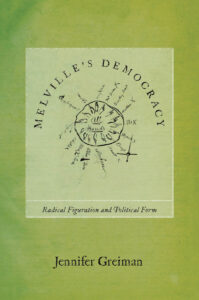Book talk with Prof. Jennifer Greiman: Melville’s Democracy

Associate Professor of English Jennifer Greiman will present a talk on her new book titled Melville’s Democracy: Radical Figuration and Political Form on Tuesday, April 4, at 5:00 pm in the ZSR Auditorium (room 404). You can access a description, reviews, excerpts, and purchasing options on the Stanford University Press website.
Description from Stanford University Press:
For Herman Melville, the instability of democracy held tremendous creative potential. Examining the centrality of political thought to Melville’s oeuvre, Jennifer Greiman argues that Melville’s densely figurative aesthetics give form to a radical reimagining of democratic foundations, relations, and ways of being—modeling how we can think democracy in political theory today.
Across Melville’s five decades of writing, from his early Pacific novels to his late poetry, Greiman identifies a literary formalism that is radically political and carries the project of democratic theory in new directions. Recovering Melville’s readings in political philosophy and aesthetics, Greiman shows how he engaged with key problems in political theory—the paradox of foundations, the vicious circles of sovereign power, the fragility of the people—to produce a body of radical democratic art and thought. Scenes of green and growing life, circular structures, and images of a groundless world emerge as forms for understanding democracy as a collective project in flux. In Melville’s experimental aesthetics, Greiman finds a significant precursor to the tradition of radical democratic theory in the US and France that emphasizes transience and creativity over the foundations and forms prized by liberalism. Such politics, she argues, are necessarily aesthetic: attuned to material and sensible distinctions, open to new forces of creativity.
Praise for Melville’s Democracy:
“Greiman succeeds at the difficult task of saying something new about democracy in her original reading of Melville as a systematic thinker of it. This is an excellent book, wonderfully written and researched.”
—Branka Arsić, author of Bird Relics: Grief and Vitalism in Thoreau
“Enthralling and fearless, Greiman’s sensuous dive into Melville’s poetics and political thinking excites and holds us tight in a world like no other. A brilliant breakthrough in close reading and political thinking. Democracy will never be the same.”
—Colin Dayan, author of With Dogs at the Edge of Life
“In Greiman’s dazzling analysis, Melville emerges as a political theorist in his own right whose ‘figurative imagination’ gives us new forms, new language, new narratives to explore what democracy is and what it should be.”
—Nathan Wolff, author of Not Quite Hope and Other Political Emotions in the Gilded Age
Categories: Department Events, Faculty News
